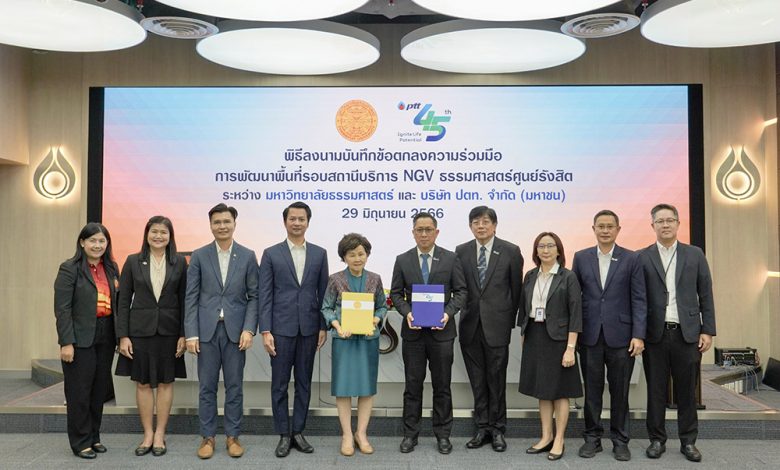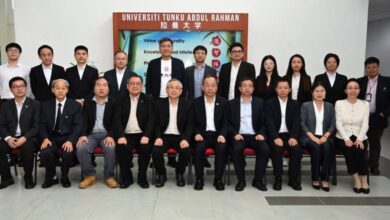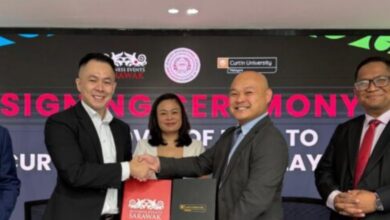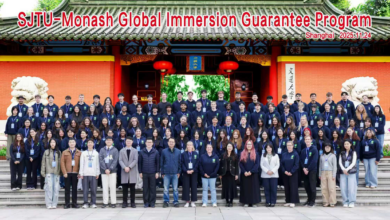Thammasat and PTT join hands to develop the area around Thammasat NGV Service Station, Rangsit Campus to become a hub of various services, ‘mixed-used station’

Assoc. Prof. Gasinee Witoonchart, Rector of Thammasat University and M.L. Peekthong Thongyai, Senior Executive Vice President, Gas Business Unit, PTT Public Company Limited (PTT) along with executives from Thammasat University and PTT attended the signing ceremony of the Memorandum of Understanding for the cooperation in development of the area around Thammasat NGV Service Station, Rangsit Campus to become a hub of various energy services in the future, a center for products and services that match the lifestyle of the new generation that is convenient and easily accessible under the concept of “Greenity+” in the form of a mixed-used station by harmoniously combining a learning center for the environment and clean energy, and as wall providing services and products that meet the needs of users in the area.
The development of NGV stations at Thammasat University, Rangsit Campus consists of a natural gas service station for special vehicles (NGV Plus Station), a charging station for electric vehicles, a co-working space for students, and a common outdoor area with shady from the green area (Outdoor common space). Apart from that, the station also support products presentation and a variety of services such as shops and restaurants in the form of both drive-in and drive-thru to meet the needs of service users who prefer sitting and dining in the restaurants and service users who want convenience in receiving food including being a travel connection point and is a learning area about clean energy. The construction is expected to be completed in 2025 with an investment of 105 million Thai baht.
Assoc. Prof. Gasinee Witoonchart, Rector of Thammasat University, said that according to the guidelines of Thammasat University which has the main idea to develop our university to become a learning space for the future world. This is achieved through organizing a curriculum that is consistent with learning in the modern world where modern technology is used as a learning aid. Thammasat also created a ‘Smart City’ environment to raise awareness of the concept of sustainability for students, making Thammasat a leading university that aims to promote skills development for a smart and sustainable future.
The joint development of the area around Thammasat NGV service station, Rangsit Campus, in cooperation between Thammasat University and the Natural Gas for Vehicles Section, PTT is to support environmentally-friendly alternative energy for service users and the public, as well as to collaboratively drive business, society and the environment to grow together sustainably. From now on, it will continue to join forces in the development of Thammasat’s NGV service stations to become a clean energy service station for modern communities and respond to the world of the future.
M.L. Peekthong Thongyai, Senior Executive Vice President, Gas Business Unit, PTT Public Company Limited (PTT), said that currently, the natural gas business for vehicles or NGV has a business model development approach to optimize NGV business with a focus on clean energy in the transport sector and integrated industry as well as presenting products and services in addition to the current NGV business which is in line with the PTT’s vision of “Powering Life with Future Energy and Beyond”.
The cooperation between Thammasat University and the Natural Gas for Vehicles Section, PTT is a good opportunity to bring experience and management potential of NGV service stations to develop areas of Thammasat NGV service stations, Rangsit Campus and surrounding areas to become a source of a variety of services in terms of energy in the future. As well as a service center that matches the lifestyle of service users, and convenient service options that are easily accessible in the form of a mixed-used station under the concept of “Greenity+”. This is to support the new lifestyle of today’s society, including building a learning center, enhancing clean energy experiences, and expanding the area to become a travel connection point as well.




